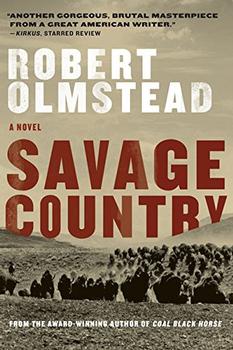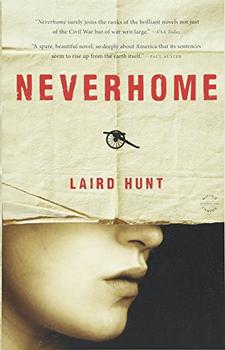Summary | Excerpt | Reviews | Beyond the book | Read-Alikes | Genres & Themes | Author Bio

First-time author Kent Wascom's The Blood of Heaven is a remarkable coming-of-age story set when the United States was struggling to form itself into a nation. The tale opens in New Orleans on January 26, 1861, at the time that the South secedes from the Union. This announcement compels 75-year-old Angel Woolsack to reminisce about his past and the changes to the country he's witnessed over the decades. He proceeds to narrate his life's story, beginning in 1799 when, as a thirteen-year-old boy, he accompanied his father throughout the American wilderness preaching the gospel to any settlers they could find. The book covers the next seven years of this young man's life – years filled with violence and heartbreak, faith and betrayal, love and loss – as he struggles to survive a harsh world in turn-of-the-century West Florida.
Wascom bases his story on the lives of three brothers – Reuben, Samuel and Nathan Kemper – who really did live in West Florida and foment rebellion there in the early part of the 19th century. He departs from fact, however, killing off Nathan early in the tale and replacing him with the entirely fictional Angel Woolsack, who is adopted as a brother by the two remaining siblings. Told from Angel's point of view, the three are witnesses to and participants in the ill-advised West Florida rebellion against the Spanish, the Louisiana Purchase and the Burr conspiracy. The author does not stick strictly to history here; the focus is on recreating a time and place rather than retelling events as they unfold. The novel is consequently the type of historical fiction one reads to pick up a sense of atmosphere rather than to learn about a slice of history one might have missed in high school.
Wascom's writing has been compared to that of Cormac McCarthy and Robert Olmstead, and for the most part those comparisons are apt. Wascom's prose has the same cadence to it that these other authors employ, bordering on poetry. His words don't so much paint a picture as evoke a feeling - a mood or environment, if you will - that just seems so very right in the historical context of the novel. His voice is his own, though, unique and haunting. I know of no other author who can more completely transport his readers to the era he wishes to portray.
Now the voices of the women drew upon me loud, a river-roar of bodily commerce. Amid the tales, Reuben's specter growing to the ceiling, some would come and join us, tapping at my shoulders and taking drinks from my cup. A gurgle of gin in one's bobbing throat, the sound of drowning. Fleshy, flush and untiring in their efforts, the whores added inventions of their own to the makings of the family name. Hemmed by bodies, I worked to douse grief and weakness as both story and toast became slurred. A young fool drunk off his feet, unlimbering his new place in the world, casting foggier and foggier glances to the stairs. I did not want them, wouldn't have one that night or for all that followed while we waited for the thaw to begin our journey south. But I couldn't curse them either – they sought survival as best they could. So I endured their offers, and proffered false and heartless boasts. I was, after all, a Kemper.
Some of Wascom's writing feels like an overt attempt to copy another author's style – for example, The Blood of Heaven contains no quotation marks (a la McCarthy) – which can at times be confusing (also like McCarthy). But Wascom's writing is bleaker; McCarthy and Olmstead insert scenes of great beauty in even their darkest works, but no such relief is present in The Blood of Heaven.
I imagine the novel will have a rather limited audience, unfortunately. First, the lack of punctuation can be a turn-off; it makes the text difficult to read and interpret, and several times I found myself re-reading a section because I found it unclear. Second, the action is incredibly violent, and not the distant, matter-of-fact violence you'd find in a McCarthy novel; it's gritty, bloody and ruthless. Terrible things happen in this book, no bones about it, and people sensitive to brutality will certainly want to avoid it. The criticism I've heard most often is that none of the characters are likeable – and that's certainly true, every one of them is pretty repellent much of the time; the book's protagonist is, in fact, a very bad man, cruel and merciless in the extreme. Many people don't need to sympathize with a character to appreciate a book, but those who do require this resonance will most likely fail to enjoy the novel. Those who don't mind these characteristics in their fiction, though, will find this one a masterpiece and well worth the effort.
A publication I subscribe to frequently asks its interview subjects, "What book are you an evangelist for?" I've got to say The Blood of Heaven fits that category for me; I thoroughly enjoyed it. I think Wascom is an incredible talent and I can't wait to introduce my friends to this writer. At only twenty-three years old, I expect he's got many more novels in the offing (The Blood of Heaven leaves many loose threads that practically scream "sequel in the works"). I'm definitely looking forward to this author's next effort, and I suspect I won't be the only one waiting in line when that book comes out.
![]() This review was originally published in The BookBrowse Review in June 2013, and has been updated for the
July 2014 edition.
Click here to go to this issue.
This review was originally published in The BookBrowse Review in June 2013, and has been updated for the
July 2014 edition.
Click here to go to this issue.

If you liked The Blood of Heaven, try these:

by Robert Olmstead
Published 2018
A gripping narrative of the infamous hunt which drove the buffalo population to near extinction--the story of a moment in our history in which mass destruction of an animal population was seen as the only route to economic solvency. And the intimate story of how that hunt changed two people forever.

by Laird Hunt
Published 2015
Neverhome tells the harrowing story of Ash Thompson during the battle for the South. Through bloodshed and hysteria and heartbreak, she becomes a hero, a folk legend, a madwoman and a traitor to the American cause.
Your guide toexceptional books
BookBrowse seeks out and recommends the best in contemporary fiction and nonfiction—books that not only engage and entertain but also deepen our understanding of ourselves and the world around us.